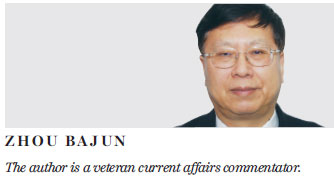Government must firmly stick to its principles
Updated: 2015-01-07 05:54
By Zhou Bajun(HK Edition)
|
|||||||
Today (Wednesday), the government launches the second stage of public consultations on the mechanism for the 2017 Chief Executive (CE) election by universal suffrage. In the next two months, it will draft a bill seeking support from the majority of Hong Kong people. Hopefully, it will obtain a two-thirds majority of lawmakers' votes; then the SAR will be able to hold elections for the CE in 2017 by means of a "one man, one vote" system. However, following the illegal "Occupy Central" campaign, the political situation in Hong Kong has become more complicated.
Firstly, as the opposition camp has become more radical, its internal divisions have become deeper. During the "Occupy" campaign, the main opposition political groups such as the Democratic Party and Civic Party became marginalized. Within the opposition camp, the younger generation has begun to offer a serious challenge to the older generation. This will continue to deepen political divisions in the HKSAR. A few lawmakers, labeled "pan-democrats", may decide to support the government's proposals on the mechanism for the 2017 CE election by universal suffrage. But they are unlikely to have much influence on the radical factions.
For many politicians in Hong Kong, politics is their career. They have to worry about winning elections and garnering sufficient votes. This is not only the case for the various political groups but also for the so-called independent lawmakers or district councilors. They always pay great attention to the outcome of Legislative Council (LegCo) as well as the district council elections.

Therefore, an important question must be asked: How can the government persuade a few opposition lawmakers to vote in favor of proposals allowing an election for the CE by universal suffrage in 2017, which are in line with the decisions of the country's top legislature? If a few opposition lawmakers were to change their political stance in favor of a compromise e.g., positions in the government, should they share the blame for any loss of political principle? If the government were to make such a deal with some opposition lawmakers, would it be fair to honest supporters in the "Love Nation and Love Hong Kong" camp?
Secondly, while the patriotic camp remains united against "Occupy", some internal differences have also emerged. During the "Occupy" campaign, some opposition political figures asked the authorities to make concessions. For example, a student organization recommended forming a new sub-functional constituency within the Nominating Committee for the 2017 election of the CE by universal suffrage. Some political leaders even suggested that the method for forming some of the Nominating Committee functional constituencies could be changed, for example converting corporate votes into personal votes. Because of these differences, it is unlikely that a majority of patriotic lawmakers will support any compromise over voting on government bills concerning the 2017 CE election.
During the first stage of the public consultation on universal suffrage, which lasted from Dec 4, 2013 to May 3, 2014, the SAR government took a "neutral" position. This was understandable as the first stage focused on the principles of universal suffrage. But, from the start, the opposition camp derailed the consultation by advocating "public nomination" and "party nomination". During the "Occupy" protests, the opposition lawmakers threatened to boycott the second stage of the consultations. Therefore, the government has to bring the second stage back onto a sensible path - developing a package for 2017 CE election by universal suffrage based on the decisions of the decisions by National People's Congress Standing Committee. Obviously, this is a daunting task.
A second stage consultation period of only two months is insufficient. But in politics even a day can be too long. Radical opposition groups will wage a series of streets fights, continuously compelling the top legislature to withdraw its decisions. No one can rule out the possibility that the government bill for the 2017 CE election may fail even before it is submitted to LegCo. The government should not waver on its principles. Instead, it may have to accept that it will fail to implement elections for the CE in 2017 by universal suffrage. Its priorities should be economic transformation and the improvement of people's livelihoods.
The potential loss of universal suffrage for the 2017 CE election would be harmful to Hong Kong. To prepare for the likelihood of these political problems the city should strengthen its economic and social policies. Economic development and improvements to citizens' livelihoods are cornerstones to building the long-term prosperity and stability of Hong Kong. Recently, President Xi Jinping and Premier Li Keqiang both told CE Leung Chun-ying that the central government greatly values, and will always support Hong Kong.
(HK Edition 01/07/2015 page1)